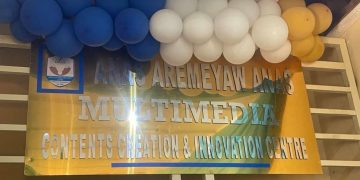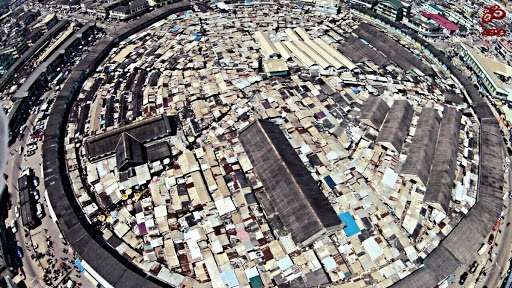Sekondi-Takoradi is a beautiful city, so wonderful a place to be that many desire. A land area of 219km2 with several beaches and other recreational centers. It is indeed a home for many.
From the sweet tasting coconuts of her beaches, the ever great fancy clubs, magnificent restaurants, hotels and pubs, the very friendly and easy going indigenes down to the amazing view of her harbor, Sekondi–Takoradi is indeed exceptional.
Seated right in the heart of the city is the Market Circle, a one of a kind with numerous wholesalers and retailers. Should one begin shopping at a particular spot, you could shop round the market back to the same spot, quite an interesting one. Though a nice place to be, it would sadden any man to see the filth that raids it streets. Inside the Market Circle, the streets and the immediate environment are covered in filth, rotten fruits and vegetables. Refuse bins overflow, gutters get choked, drains remain open, various litter swamp the entire market area. What a disappointing scene! Much more disappointing is the lack of concern of the market folks for the environment in which they sit to sell and the numerous health risks it poses. What could be missing out? Why should there be such a disheartening situation in a 21st century market. Well, as some would say “the rot that spoils.”
Indeed, the rot that spoils. The beauty of Ghana’s only Market Circle is buried in filth – the rot that spoils it. Today, Market Circle remains a place unsafe for our health, it remains untidy, dirty and congested. You would concur that the challenge here is not the filth but actually a wrong mindset which the people do have. “As a man thinks in his heart so is he,” our challenge bores down to what the people have believed as true and right to practice. They litter and see no wrong with that, they spit anywhere in public and find it a relief, mothers replace their babies’ diapers and leave them at street corners, food leftovers are tossed over to market rats and yet no wrong is seen in them.
We need to take deliberate steps in getting rid of the filth at Market Circle. We ought to take out this rot that spoils the beauty of our society. The question however remains of what approach to use. Well, according to the Robert Dilts Logical Levels of Change, the environment forms the basis of a journey to success or change. Our environment affects our behavior, capabilities, values and beliefs, our identity and our visions. To rid our society of this canker, we ought to create a new environment, an environment that highlights cleanliness and deals with the root cause of filth – decongesting the market, removing old and damaged stalls, clearing choked gutters and covering them up, removing open air waste collection points and employing effective waste management methods. All this can be done to present an environment that will not support a filthy lifestyle. The right environment would then provide suitable grounds for the development of right attitudes and conducts. Next to that would be dealing with our people’s mindset as it informs their lifestyle and approach to life. As beautiful as our city is, our people need a ‘beautiful mind’, a mind renewed of the old and awakened to the need of a clean and tidied environment. Our minds when renewed, would become a check on our lifestyle. With traders being the predominant occupants of the market, it is obvious that they become the target for a renewed mindset. But, how will this work out? A social map of traders in Market Circle shows that they are most influenced by three groups of people, their customers, next children and family and then market authorities. To carry out this change, we need a strong campaign that admonishes traders on the need to keep a tidied environment but more importantly discourages people (i.e. customers to traders) from buying in filthy areas of the market highlighting on the health risks and many other disadvantages it poses. If this is carried on consistently, our people would gradually wake up to that consciousness.
Our children, being a second point of influence would be helpful. Children are generally known to affect to a large extent the actions of their parents. If our children in schools are purposefully taught environmental hygiene, taught to be responsible for a tidied environment and encouraged to make it their lifestyle and as well pass it on to their families, we would begin to observe them discourage their relatives more often parents from unacceptable behaviors. Our kids that return to the market from school would not litter around nor allow littering in their surroundings. By that a tidied environment would be sustained.
Last to ensure this right mindset and attitudes would be market authorities. Market authorities must enforce sanitation laws. Efforts should be made to ensure that perpetuators of a filthy environment are duly sanctioned. A public education for market folks should be considered so as to educate traders and encourage among them the sustenance of a hygienic environment.
When this rot is dealt with, Market Circle will look good again, it would be easier and convenient shopping round the circle and as well, stand no health risks. Takoradi would at large become a better place.
Source: Joyous Ocran, Takoradi | joyousocran@yahoo.com]]>
Next to that would be dealing with our people’s mindset as it informs their lifestyle and approach to life. As beautiful as our city is, our people need a ‘beautiful mind’, a mind renewed of the old and awakened to the need of a clean and tidied environment. Our minds when renewed, would become a check on our lifestyle. With traders being the predominant occupants of the market, it is obvious that they become the target for a renewed mindset. But, how will this work out? A social map of traders in Market Circle shows that they are most influenced by three groups of people, their customers, next children and family and then market authorities. To carry out this change, we need a strong campaign that admonishes traders on the need to keep a tidied environment but more importantly discourages people (i.e. customers to traders) from buying in filthy areas of the market highlighting on the health risks and many other disadvantages it poses. If this is carried on consistently, our people would gradually wake up to that consciousness.
Our children, being a second point of influence would be helpful. Children are generally known to affect to a large extent the actions of their parents. If our children in schools are purposefully taught environmental hygiene, taught to be responsible for a tidied environment and encouraged to make it their lifestyle and as well pass it on to their families, we would begin to observe them discourage their relatives more often parents from unacceptable behaviors. Our kids that return to the market from school would not litter around nor allow littering in their surroundings. By that a tidied environment would be sustained.
Last to ensure this right mindset and attitudes would be market authorities. Market authorities must enforce sanitation laws. Efforts should be made to ensure that perpetuators of a filthy environment are duly sanctioned. A public education for market folks should be considered so as to educate traders and encourage among them the sustenance of a hygienic environment.
When this rot is dealt with, Market Circle will look good again, it would be easier and convenient shopping round the circle and as well, stand no health risks. Takoradi would at large become a better place.
Source: Joyous Ocran, Takoradi | joyousocran@yahoo.com]]>
Market Circle: The rot that spoils
Reading Time: 5 mins read
Recent Posts
- Seidu Agongo launches month-long Ramadan donations to mothers
- IWD: You are powerful, capable – Konadu Agyeman-Rawlings celebrates women
- Anas thanks Emir of Gombe for naming a Centre at North Eastern University after him
- Anas Aremeyaw Anas Multimedia Centre Commissioned at North Eastern University, Gombe
- Amend Transition Act to reflect current governance structure – Benjamin Quashie
- Evidence abounds that lithovit is efficacious: A-G defends withdrawal of Opuni-Agongo case
- Full Text: Check Attorney-General’s justification for discontinuing high-profile cases
- OSP declares Ken Ofori-Atta wanted in multiple corruption cases
Popular Stories
-
IWD: You are powerful, capable – Konadu Agyeman-Rawlings celebrates women
-
Anas Aremeyaw Anas Multimedia Centre Commissioned at North Eastern University, Gombe
-
Anas thanks Emir of Gombe for naming a Centre at North Eastern University after him
-
Seidu Agongo launches month-long Ramadan donations to mothers
-
Stephen Hawking dies aged 76
@2023 – Newstitbits.com. All Rights Reserved.























